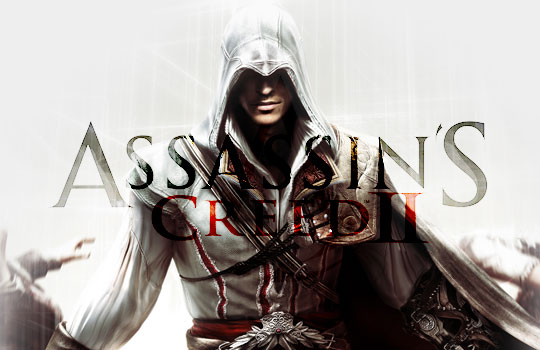
I was thinking about doing a write-up of my favorite games from 2009, but as I was going over most of the games I played last year, many of my favorites turned out to be from 2008 or earlier. I got a few of 2009's finest for Christmas, but so far, I've only had time to play through one of them - Assassin's Creed 2. Luckily, it turned out to be one of my favorite games in a good while, so instead of doing a list I thought I'd just write a game review instead. Read on for tales of free running, theft, death-defying acrobatics, and of course, assassination.
As a note of precaution, I am going to try to keep spoilers for the first game to a minimum, but in order to talk about the opening sequence of the second game, there might be some slight spoilers for the first one. If you haven't played Assassin's Creed 1 yet, and you're planning on doing so, proceed with caution. I will not spoil the content of AC2, save for the introductory portion of the game.
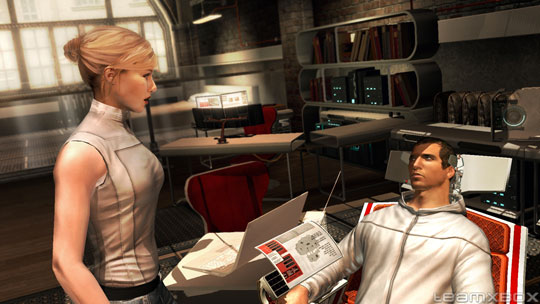
A little over two years ago, I picked up Assassin's Creed 1 (also as a Christmas gift, I believe), and quickly played through it over the course of a few weeks. It was a fun game. With sprawling ancient urban environments, the visuals were particularly impressive, as were the movement mechanics for the player. In the end though, the whole thing became somewhat repetitive, with each level in the game playing exactly like the last. There were a few quirks with the fundaments of the game that could probably have been overlooked if the rest of the game had been better, but which ended up standing out instead. And the finale of the game, which was deliberately left open for a sequel, was somewhat of a letdown.
Despite the first game's drawbacks, however, I did have a good time with it. So when November 2009 rolled around and Assassin's Creed 2 was released to better reviews than its predecessor, I was excited. Unfortunately for me, I usually don't buy myself many games between November and December, just in case someone decides to get me a game for Christmas or my birthday. I waited for the holidays, did in fact, get the game, and played through it over the last few weeks. After nearly 24 total hours of game-time and collecting 47 of 50 achievements, I can say with confidence (and puns) that Assassin's Creed 2 is leaps and bounds above Assassin's Creed 1; it's truly a great game.
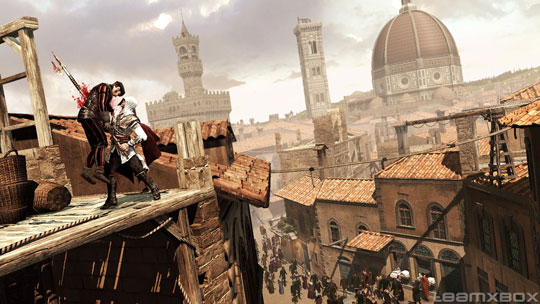
AC2 begins right where the first game left off. Desmond Miles, the surrogate protagonist of both the first and second games, has finished locating the Piece of Eden for Abstergo, and locked in the laboratory with the Animus. Lucy, the technician who projects sympathy for Desmond in the first game, returns to the lab and the two escape from the Abstergo building, seeking refuge with a group of modern-day Assassins. Armed with their own Animus, the group enlists Desmond to help them find out the truth behind the Piece of Eden, and we delve once more into history via Desmond's biological memories.
Almost all of the game takes place inside the Animus, in a virtual recreation of ancient Italy. The story follows Desmond's ancestor Ezio as he uncovers a vast Templar plot, and includes many historical figures like Niccolò Machiavelli, Rodrigo Borgia (Pope Alexander VI), and even Leonardo da Vinci.
One thing you'll notice right from the start is that AC2 makes a much stronger effort to explain the story better than the first game. The virtual past is a bit different, it is explained, because the new Animus is more feature-packed than the one used at Abstergo. At various points in the story the other characters who monitor Desmond's progress will voice over and explain what is happening. And all the people and places of interest you visit in the game is explained in historical context via a large collection of database entries that are added to Desmond's Animus menu as you progress through the game. It's all very well done, and I spent a lot of time reading the database as entries were added to it. In many instances, the historical information is actually a pretty interesting read, and it adds a lot to the game as well.
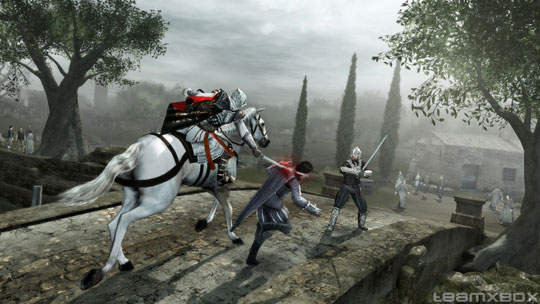
The story that Ubisoft has woven into real-life history for Assassin's Creed, particularly this second game, is compelling. The interactions between Ezio and other characters, both historical and fictional, is very well done and does much to add a distinctly human element to the game. Whereas in the first AC game you were relegated to performing the same pattern of actions over and over with very little narrative in between, the second game gives you many more unique missions while stringing them along with strong story elements in between.
Gameplay in AC2 is varied and thoughtful. Once the initial theatrics are over and you've assumed your role of Ezio, you're given free reign to explore a sizable portion of Renaissance Florence. Similar to AC1, you're able to climb tall structures and use them to scope out nearby missions. Unlike AC1, however, you'll find that you now have access to a few different types of vendor stalls, where you can buy weapons, new armor, quick-travel to different parts of Italy, etc. Missions that do not progress the story include assassination contracts, races, and fighting. There are also many treasures scattered throughout each explorable area that pad your wallet and eventually help you learn more fighting moves and increase your health points.
Combat is somewhat basic, but less frustrating than in the original game. There are more ways to dispatch enemies, and there isn't as much emphasis on maintaining an overall rhythm, so there are many fewer times where you get caught in a string of attacks that are impossible to stop. Additionally, you can buy new weapons from blacksmiths, and you can use weapons dropped or taken from enemies as well.
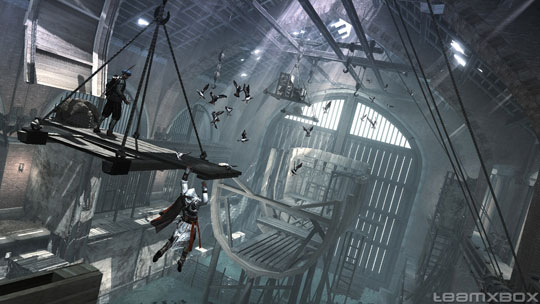
Sometimes, you might not want to fight the throng of guards chasing you - not a problem! There are far more places to hide in AC2, and it's much easier to tell when you're blending into a crowd (for anonymity). You can also hire bands of thieves, mercenaries, and courtesans to help give you a little cover and distract or fight guards when necessary.
Finally, player movement in Assassin's Creed 2 seems much more refined than before. Ezio climbs and swings around structures much faster than Altaïr, and if you're like me, you will be happy to see is that swimming has been added to the game engine, so you no longer have to fear the random instant death of a bad jump near water. Overall, player movement in AC2 is very fluid, and even though you'll be spending much of your time watching Ezio perform stunts that seem super-human, the animation is so natural you'll come away feeling like it really could be possible for a person to move the way he does. With Prince of Persia, Assassin's Creed, Splinter Cell, and a host of other games, Ubisoft has a good lock on games involving non-linear movement/acrobatic mechanics, and with each new game, the engine only seems to get better.
In addition to the regular assassin gameplay in AC2, there are also a good number of hidden puzzle sequences, where you solve a collection of ever-challenging puzzles in order to uncover more of the secrets about the Piece of Eden. These puzzles serve as a good break from the action now and then, and are quite devious towards the end of the game. Luckily, you can always choose to solve them later on. These puzzles, along with the collectible codex pages and all the other supplemental information included in the Animus database, are a good example of the efforts Ubisoft went to in order to explain the Assassin's Creed world better in the second game. Both the cryptographer and conspiracy buff inside you will jump for joy.
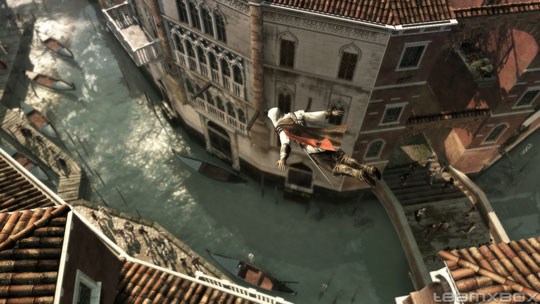
Gameplay aside, the very first thing that might draw you into AC2 (or the franchise in general) is the look of the game.
The original game, Assassin's Creed 1, had some good graphics; even playing the game today, I am still amazed at how well the game engine draws the vast expanse of ancient cities and surrounding countryside. Assassin's Creed 2 is no different - and oftentimes better! It is a visual feast, and Renaissance Italy has never looked so good. Everywhere you go, people are walking, talking doing things. The buildings in each area you visit are gritty yet fantastic. Historical sites, like Basilica di San Lorenzo and Basilica di San Marco, are recreated somewhat faithfully (at least, close enough for a game), as are the surrounding area structures. The day/night cycle is slower than most games, and both look great. Visual effects for the Animus and Eagle Vision have been ramped up from the original game. Ezio even looks wet after he climbs out of some water.
Sound is equally good. The voice acting for all the major characters is believable, and the little bits of Italian you hear now and then (attributed to a flaw in the Animus' translation software) adds to the illusion of the whole thing. I thought the soundtrack was particularly nice; it instills feelings of awe, tension, mystery, and urgency at all the right moments, and fills in the gaps between the action nicely.
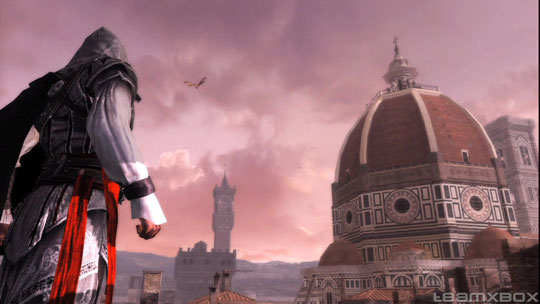
Assassin's Creed 2 isn't without its faults of course, but they number much fewer than the original, and are ultimately much easier to forgive for all the greatness of the rest of the game. For example, as with Altaïr in the first game, Ezio manages to make some clumsy jumps now and then, which can sometimes result in an accidental falling death. It doesn't happen often, and I can see how the game engine can get confused about exactly which platform you might be aiming for in the distance, but it's not a fun time when it happens.
As with another game I reviewed not so long ago, health potions also seem to make the game a little too easy. Naturally, the farther you get into the game, the harder the bad guys can hit you, sometimes taking 4-5 hit points in one attack. But early in the game you gain the ability to carry around vials that can refill many depleted hit points at once. You eventually are able to carry a maximum of 15 of these vials, and with so many at your disposal, it becomes almost impossible to die, save for an accidental fall. The vials are important to AC2, because unlike AC1, you do not regenerate health over time, but it still feels a little cheap sometimes to be able to just click the D-Pad and become healed. Of course, I also like the idea of your character becoming more adept at what he/she does as you progress through a game, so I can't hate on this too much. Poor planning or lack of funds will limit your supply of vials, so I can live with it.
One final thought I had on the subject of problems is that some of the puzzles you uncover are either unclear in what they want you to do, or are difficult to devise. I didn't have many problems with them for the most part, but some of them seemed to require some very non-linear thought to be solved, and I actually had to wait for the hint to appear before I could get through (an optional hint can be given after a certain amount of time has been spent on a puzzle). This isn't really a problem with the game, I guess, but for some people who aren't very good at deciphering numerical puzzles, it could prove frustrating.
In any case, none of these things detracted from the experience much for me. The level of polish applied to AC2, especially compared to AC1, really shows in this respect.
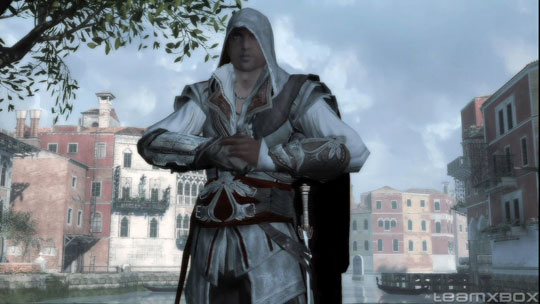
On the whole, I really enjoyed Assassin's Creed 2. It continued the story from the first game in a smart and provocative way, it fixed many of the problems from the first game, and it did so without being tedious, and without running out of gas. There are lots of things to do in AC2, and if the story line for the series interests you, I definitely recommend giving this game a shot (and the first game before that, if you haven't played it already). I'm really looking forward to Assassin's Creed 3, which I hear is due out in about 2 years. That's alright though, because I'll probably need a while to collect all those feathers (think flags from AC1).